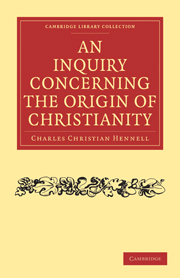Book contents
- Frontmatter
- PREFACE
- Contents
- ERRATA
- CHAPTER I Historical sketch, from the Babylonish captivity to the death of Jesus
- CHAPTER II Historical sketch, continued to the end of the first century
- CHAPTER III On the date and credibility of the Gospel of Matthew
- CHAPTER IV On the date and credibility of the Gospel of Mark
- CHAPTER V On the date and credibility of the Gospel of Luke
- CHAPTER VI On the date and credibility of the Gospel of John
- CHAPTER VII Examination of the accounts of the Resurrection and Ascension
- CHAPTER VIII Remarks on the other miracles in the four Gospels
- CHAPTER IX General objections to the miracles of Jesus
- CHAPTER X Remarks on the miracles in the Acts of the Apostles
- CHAPTER XI On the evidence afforded to the miracles by the apostolic writings
- CHAPTER XII On the prophecies
- CHAPTER XIII On the parts of Isaiah supposed to relate to Christ
- CHAPTER XIV On the book of Daniel
- CHAPTER XV Whether Jesus foretold his own death and resurrection
- CHAPTER XVI On the character, views, and doctrine of Jesus
- CHAPTER XVII Comparison of the precepts of Jesus with the Jewish writings
- CHAPTER XVIII Concluding reflections
- APPENDIX
CHAPTER VI - On the date and credibility of the Gospel of John
Published online by Cambridge University Press: 05 March 2012
- Frontmatter
- PREFACE
- Contents
- ERRATA
- CHAPTER I Historical sketch, from the Babylonish captivity to the death of Jesus
- CHAPTER II Historical sketch, continued to the end of the first century
- CHAPTER III On the date and credibility of the Gospel of Matthew
- CHAPTER IV On the date and credibility of the Gospel of Mark
- CHAPTER V On the date and credibility of the Gospel of Luke
- CHAPTER VI On the date and credibility of the Gospel of John
- CHAPTER VII Examination of the accounts of the Resurrection and Ascension
- CHAPTER VIII Remarks on the other miracles in the four Gospels
- CHAPTER IX General objections to the miracles of Jesus
- CHAPTER X Remarks on the miracles in the Acts of the Apostles
- CHAPTER XI On the evidence afforded to the miracles by the apostolic writings
- CHAPTER XII On the prophecies
- CHAPTER XIII On the parts of Isaiah supposed to relate to Christ
- CHAPTER XIV On the book of Daniel
- CHAPTER XV Whether Jesus foretold his own death and resurrection
- CHAPTER XVI On the character, views, and doctrine of Jesus
- CHAPTER XVII Comparison of the precepts of Jesus with the Jewish writings
- CHAPTER XVIII Concluding reflections
- APPENDIX
Summary
The other three Gospels agree very well in the style of the discourses attributed to Christ, which are chiefly parables and short pithy sayings. They represent him as beginning his public preaching in Galilee, proceeding after some time to Jerusalem, and suffering there. The chief topic dwelt upon is the approach of the kingdom of heaven; and they contain much concerning the fall of Jerusalem.
But the Gospel of John is of a very different character. The discourses of Christ are here long controversial orations without any parables: he is made to journey from Galilee to Jerusalem, and back again, many times; the kingdom of heaven is nearly lost sight of; the fall of Jerusalem never alluded to; and we have, instead of these, several new subjects, viz. the incarnation of the word or logos in the person of Christ; his coming down from heaven; his relationship to the Father; and the promise of the Comforter or Holy Spirit. Also, with few exceptions, a new set of miracles is attributed to Christ.
From the resemblance of style, the author of this Gospel and of the three Epistles appears to be the same. In the first Epistle, he says, that he had been an eyewitness of the word of life. In the last two he calls himself “the elder.” There was a John, usually called the elder or presbyter, to distinguish him from John the Apostle, the brother of James; and Papias calls him also “a disciple of Jesus.”
- Type
- Chapter
- Information
- An Inquiry Concerning the Origin of Christianity , pp. 104 - 112Publisher: Cambridge University PressPrint publication year: 2010First published in: 1838



